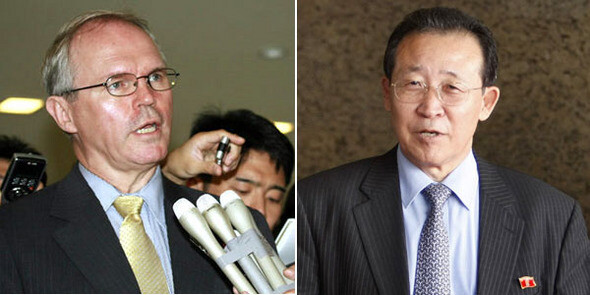hankyoreh
Links to other country sites 다른 나라 사이트 링크
Nuclear negotiators make progress, but no agreement

At a press conference in Geneva on March 14, Christopher Hill, the U.S. chief negotiator to the six-party talks, said that some progress had been made in his meeting with North Korea, but that they had still not reached an agreement.
After a meeting with his North Korean counterpart, Kim Kye-gwan, Hill remarked that the two sides had had very realistic and useful discussions on key issues such as Pyongyang’s declaration of its nuclear programs, including the uranium enrichment program, or UEP, adding that many things remain to be addressed.
Responding to allegations that the North has a clandestine uranium enrichment program and the North’s alleged nuclear cooperation with Syria, Kim said after a dinner with Hill that night, “Such things did not exist in the past, do not exist now and will not exist in the future. As the U.S. is late in implementing its promises, we will also be late in carrying out ours.”
Kim was referring to an agreement that was reached in February 2007 via a six-party forum - which involves the United States, North Korea, China, Japan, Russia and South Korea - and was reconfirmed at the conclusion of a summit held between the two Koreas on October 4.
Under the agreement, North Korea is to receive energy aid and diplomatic concessions, including removal from the U.S. list of state sponsors of terror and the lifting of sanctions under the Trading with the Enemy Act. In return, the North agreed to shut down its nuclear reactor and provide a full declaration of its nuclear programs by the end of last year.
The negotiation process has stalled in recent moths, however, putting a damper on progress made when the North began shutting down its Yongbyon reactor last year. The North claims that a declaration it submitted in November is complete, while the United States is demanding a more detailed list. The North also says that the promised energy aid has not arrived as scheduled.
The U.S. assistant secretary of state said he thought that he and Kim had made some progress on the UEP issue, but that the issue had not yet been resolved. Both Kim and Hill indicated that they were unable to make decisive progress on the UEP issue, which was a key issue of their meeting.
The atmosphere of the meeting did not appear to have been bad. Kim expressed his satisfaction with the talks in the comments he made to the assembled reporters. Hill said that he had a strong desire to resolve the issue within the year, adding that the two nations should pick up the pace. He made it clear to North Korea that the reclusive state should also speed up its efforts to resolve the issue. This could be interpreted to mean that even though the two sides were unable to reach a conclusion at the Genera meeting, they will continue to discuss a way to narrow their differences of opinion.
Following the meeting, the delegations from Pyongyang and Washington held intensive discussions at their respective missions to Geneva. Kim and Hill then met at a restaurant in the city until 11 p.m. that night.
Please direct questions or comments to [englishhani@hani.co.kr]
Editorial・opinion
![[Column] Season 2 of special prosecutor probe may be coming to Korea soon [Column] Season 2 of special prosecutor probe may be coming to Korea soon](https://flexible.img.hani.co.kr/flexible/normal/500/300/imgdb/original/2024/0426/3317141030699447.jpg) [Column] Season 2 of special prosecutor probe may be coming to Korea soon
[Column] Season 2 of special prosecutor probe may be coming to Korea soon![[Column] Park Geun-hye déjà vu in Yoon Suk-yeol [Column] Park Geun-hye déjà vu in Yoon Suk-yeol](https://flexible.img.hani.co.kr/flexible/normal/500/300/imgdb/original/2024/0424/651713945113788.jpg) [Column] Park Geun-hye déjà vu in Yoon Suk-yeol
[Column] Park Geun-hye déjà vu in Yoon Suk-yeol- [Editorial] New weight of N. Korea’s nuclear threats makes dialogue all the more urgent
- [Guest essay] The real reason Korea’s new right wants to dub Rhee a founding father
- [Column] ‘Choson’: Is it time we start referring to N. Korea in its own terms?
- [Editorial] Japan’s rewriting of history with Korea has gone too far
- [Column] The president’s questionable capacity for dialogue
- [Column] Are chaebol firms just pizza pies for families to divvy up as they please?
- [Column] Has Korea, too, crossed the Rubicon on China?
- [Correspondent’s column] In Japan’s alliance with US, echoes of its past alliances with UK
Most viewed articles
- 1Why Kim Jong-un is scrapping the term ‘Day of the Sun’ and toning down fanfare for predecessors
- 2After election rout, Yoon’s left with 3 choices for dealing with the opposition
- 3Two factors that’ll decide if Korea’s economy keeps on its upward trend
- 4‘We must say no’: Seoul defense chief on Korean, USFK involvement in hypothetical Taiwan crisis
- 5AI is catching up with humans at a ‘shocking’ rate
- 6Noting shared ‘values,’ Korea hints at passport-free travel with Japan
- 746% of cases of violence against women in Korea perpetrated by intimate partner, study finds
- 8Why Korea shouldn’t welcome Japan’s newly beefed up defense cooperation with US
- 9Amnesty notes ‘erosion’ of freedom of expression in Korea in annual human rights report
- 10Ethnic Koreans in Japan's Utoro village wait for Seoul's help